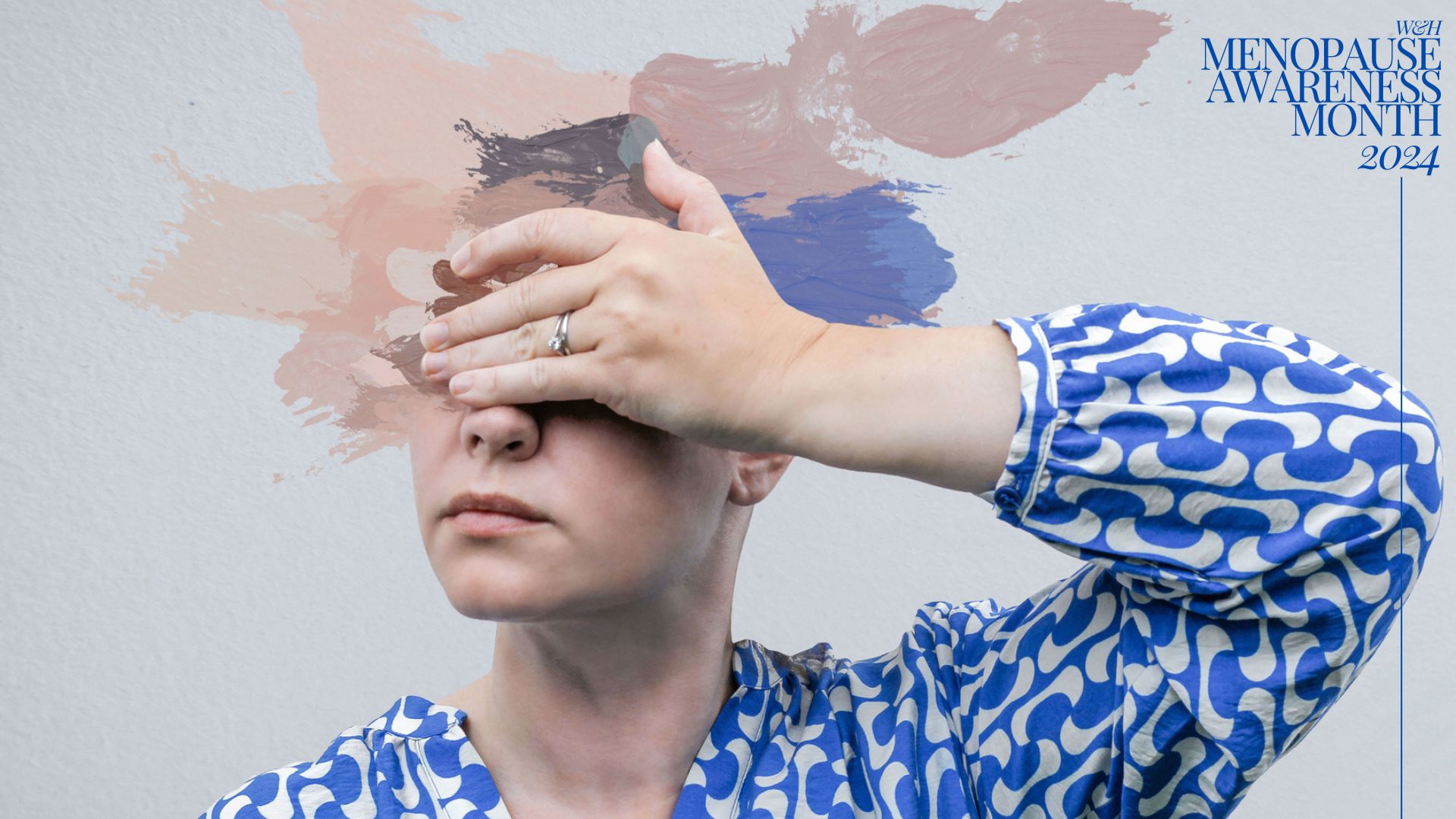
Perimenopause can last for up to 10 years before menopause finally happens, so why is it a shock to many when it starts? With the lasting taboo around the subject and the widely-held belief that it's 'just' one of life's natural stages, many people go into perimenopause unknowingly. Here Kathryn Williams reveals her own journey and speaks to other women about what perimenopause really feels like.
I was well prepared for my first period. Well, sort of. I remember my mum telling me that the whole thing would be something of a non-event to begin with, a mere ‘smudge’ on my underwear, so light I’d probably barely notice it. So far so good, right? Except that when my period did arrive a few months after my 13th birthday, it was less of a smudge and more of a flood. Menstruation, it seemed, had arrived with a vengeance.
Still, while the event itself wasn’t quite what I was expecting, at least my mum and the school curriculum had deemed periods a major enough life event that I should probably be given a heads up on the whole matter. Based on that, you can imagine my surprise when perimenopause symptoms came knocking on my door a few days before my 41st birthday without anyone so much as saying a word.
Suddenly, I found myself dealing with debilitating nausea and fatigue, insomnia, an inability to think clearly, and a level of worry and anxiety I’d not experienced before. But I had only just entered my 40s, so it couldn’t possibly be perimenopause - could it?
When does perimenopause start?
According to menopause expert Dr Mary Claire Haver, a board-certified OB/GYN and founder of Mary Claire Wellness, there's a variation in the ages women can experience menopause - from 45 to 55 is most common. “The average age of that one year after your cycle stops, so menopause, is 51 to 52 years old. However 'normal' is 45 to 55 and there’s a big variation. Perimenopause begins 7 to 10 years before that last menstrual period,” she said in a recent interview with neuroscientist Dr Andrew Huberman.
I know it sounds like a strange thing to say, but I like getting older. Perhaps it’s because my sister died at the age of 25 from Cystic Fibrosis and I understand all too well that growing old is a privilege denied to many. Or maybe it’s just that I’ve always been an old soul and I feel like I’m finally growing into myself.
Either way, I’ve always seen each life stage as a gift. And yet, part of me has been slightly caught off guard by this transition, which arrived earlier than I thought it would. Most doctors consider 41 to be on the young side but it turns out, I'm not quite the outlier I thought I was. In fact, 1 in 100 women experience menopause under the age of 40 - like 38-year-old Rachel.
“The hardest part for me is the social isolation,” she says. “No one in my peer group is going through this," she tells me. And even if they were, Menopause Support UK reports that 45% of women haven’t spoken to their GP about the symptoms they’re experiencing and very few women talk about menopause symptoms or the transition with other women.
What does perimenopause feel like?
Whether you’re peri, post, or just plain meno, the three stages of menopause can leave you feeling like a different person. It’s rare to meet someone like my dear friend Liz, who describes her menopause journey as a completely smooth ride. “I didn’t have a single symptom except for one night of hot flushes,” she tells me, almost with a tinge of guilt. "One month my period didn’t arrive and that was it. I guess I was just really lucky.”
According to Menopause Support UK, there are approximately 13 million peri and post-menopausal women in the UK. Of those, 3 in 4 will experience symptoms with 1 in 4 having symptoms classed as debilitating - like Kate, who at the age of 45, started suffering from heavy periods so bad she eventually required surgery.
“The most challenging symptoms were physical,” she told me. “Heavy periods meant having to think through travel logistics for work. That was really challenging. I had to be very well organised and it was tricky as I was anaemic several times, which impacted my energy levels and my ability to exercise.”
Kate is far from alone though. In 2022, Channel 4 commissioned a landmark study based on the largest-ever survey of perimenopausal and menopausal women in the UK. The resulting report, produced by the Fawcett Society, showed that 77% of women have at least one menopause symptom they find ‘very difficult’ and 44% have three or more symptoms they describe as ‘severe’.
Of the more than 4,000 women who took part, 84% said they found sleeping difficult, 73% had issues with brain fog, and a further 69% said they struggled with menopausal anxiety and depression. All symptoms I can relate to - and I'm not the only one.
"A gnawing anxiety I couldn't shake"
At 45, Sarah knew something was shifting inside when she started to feel overcome with incessant worry. “It wasn’t my usual feeling of anxiety,” she told me. “It was more of a gnawing anxiety that I couldn’t shake.”
She didn’t need to explain it to me further. I resonated with her words immediately. While research into this area remains limited and we need to be cautious of how we interpret the data that is available, studies appear to support the premise that women experience greater incidences of both anxiety and depression during the perimenopausal years.
A 2024 study of more than 9,000 women around the world published in the Journal of Affective Disorders found that perimenopausal women have a 40% higher rate of depression compared to premenopausal women. An earlier study published in 2014 in the journal Menopause, tracked close to 3,000 women across 10 years and found that those aged 40 to 55 were 51% more likely than premenopausal women to report feelings of anxiety. Women with low anxiety during their premenopausal years were also more likely to report high anxiety during perimenopause.
Like everyone, I have experienced feelings of worry and anxiety throughout my life. But I have been very fortunate that these feelings have always been situation-specific and time-limited, and have not impaired my ability to function. While that remains the case, like Sarah, I’ve noticed that these feelings of anxiety and worry have taken on more of a gnawing quality.
I find myself fretting that everyone in my life is going to die and I’ll end up like Bridget Jones, alone and discovered weeks after my death half-eaten by Alsatians. There are less dramatic worries - just to reassure you - but worry and anxiety certainly take up more space in my mind than they used to. On the upside, I’m also struggling with brain fog and memory loss, so perhaps they’ll come a day sometime soon when I won’t even remember I had these worries.

"I feel like I'm going crazy"
“It’s embarrassing. I meet people in the street, people I know well, and I can’t for the life of me remember their names,” says Jenny, a 58-year-old mum of two grown children who has struggled with brain fog and memory loss since she was in her early 40s.
We pondered together when the cognitive wheels started falling off, although rather ironically, neither of us could remember. We settled on sometime in our 30s because that’s the decade we suddenly realised we couldn’t go to the supermarket without a shopping list.
“It’s so frustrating to know that you know something and can't recall it,” Jenny told me. “I feel like I’m going crazy.” And yet, she’s not. It’s estimated that women lose around 20% of their cognitive metabolism after 40. A 2021 scientific review of multiple studies published in the World Journal of Psychiatry revealed that cognitive decline in women undergoing the menopausal transition has a prevalence of between 44% to 62%.
My once-sharp mind feels frustratingly sluggish these days and I often feel a sense of shame and guilt that I’m perhaps not living up to my potential. Would I be a better wife and stepmum if I had more energy and brain power? Could I achieve more in my career if my mind didn’t feel like a giant jar of treacle?
On top of all the symptoms that come with this rather monumental life transition, almost all of the women I spoke to shared one common struggle: a difficulty in accepting that they’re growing older.
"I'm learning to adjust"
If growing up with a seriously ill sibling taught me anything, it’s that there’s so much in life we can’t control. People we love die, our bodies change, and things that were once predictable, familiar and known become unpredictable, unfamiliar and unknown. Rather than fight what is, I’m learning to adjust, adapt, and begin again. Being present with what’s here, rather than longing for what isn’t is a skill I’m working on cultivating. But just because we learn to embrace what is, doesn’t mean we can’t also grieve what was.
We’re sold a story when we’re younger that grief is something we’ll only feel when someone we love dies. But that’s not true. We can grieve our bodies changing just as much as we might grieve the end of a relationship, career or our children leaving home. For women who may have wanted biological children but for whatever reason, were unable to do that, the end of their reproductive years can also trigger profound feelings of sadness and loss.
But it’s important to remember that life is cyclical, not linear. Just like nature, we are constantly moving through our inner seasons. All of us will winter at one time or another. Most of us will winter frequently and some of us will winter far more than others. But none of us can escape those times in our lives when our branches are stripped bare. These times are essential, and if we’re brave enough, they may be the very making of us.







